Picture this: A customer tries to reach your support team late at night, only to find out that it is offline.
They're left feeling frustrated with unanswered queries. Sounds familiar, right?
Dealing with this pain point is crucial for businesses who want to maintain a high level of customer satisfaction and retain their competitive edge.
That's where enterprise AI chatbots come into play.
These chatbots, powered by artificial intelligence, can effectively handle customer requests, streamline operations, and reduce costs – all while functioning around the clock.
Now, imagine having this powerful tool integrated into your business ecosystem, enhancing not only customer service but also the overall efficiency of your organization.
Read on and find out why and how you should leverage Enterprise AI to your advantage.
What Are Enterprise AI Chatbots?
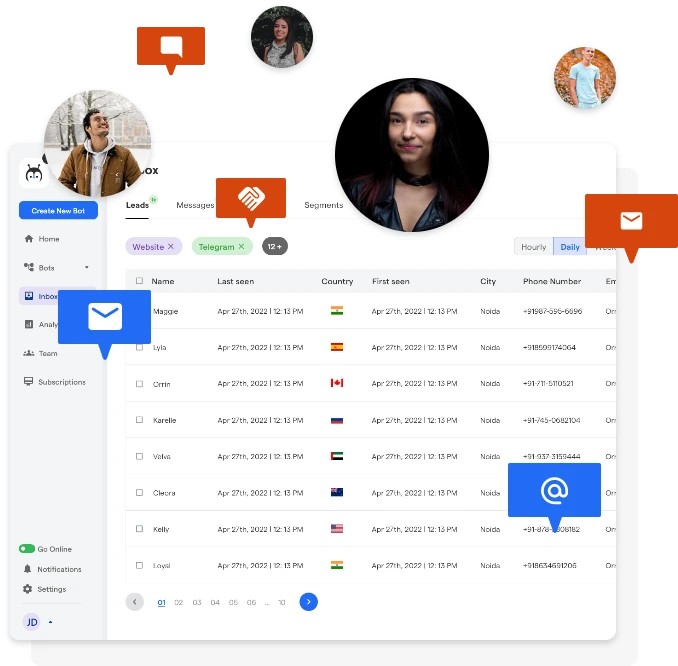
AI chatbots, or artificial intelligence chatbots, are computer programs designed to simulate conversations with human users. They use natural language processing (NLP) and machine learning to understand user queries and provide relevant responses.
Enterprise AI chatbots are specifically tailored to meet businesses' needs. They are designed to handle complex tasks, provide personalized information, and integrate seamlessly with existing enterprise systems.
Enterprise chatbots offer numerous benefits for enterprises. They enable organizations to offer 24/7 customer support, automate repetitive tasks, and provide instant and accurate information to users. This not only saves time and resources but also enhances the overall customer experience.
Let's look at some use cases of enterprise chatbots in the enterprise world.
Use Cases of AI Chatbots in the Enterprise World
Customer Support: AI chatbots can handle many customer queries, providing immediate assistance and resolving issues efficiently. They can also handle multiple conversations simultaneously, ensuring that customers receive prompt responses.
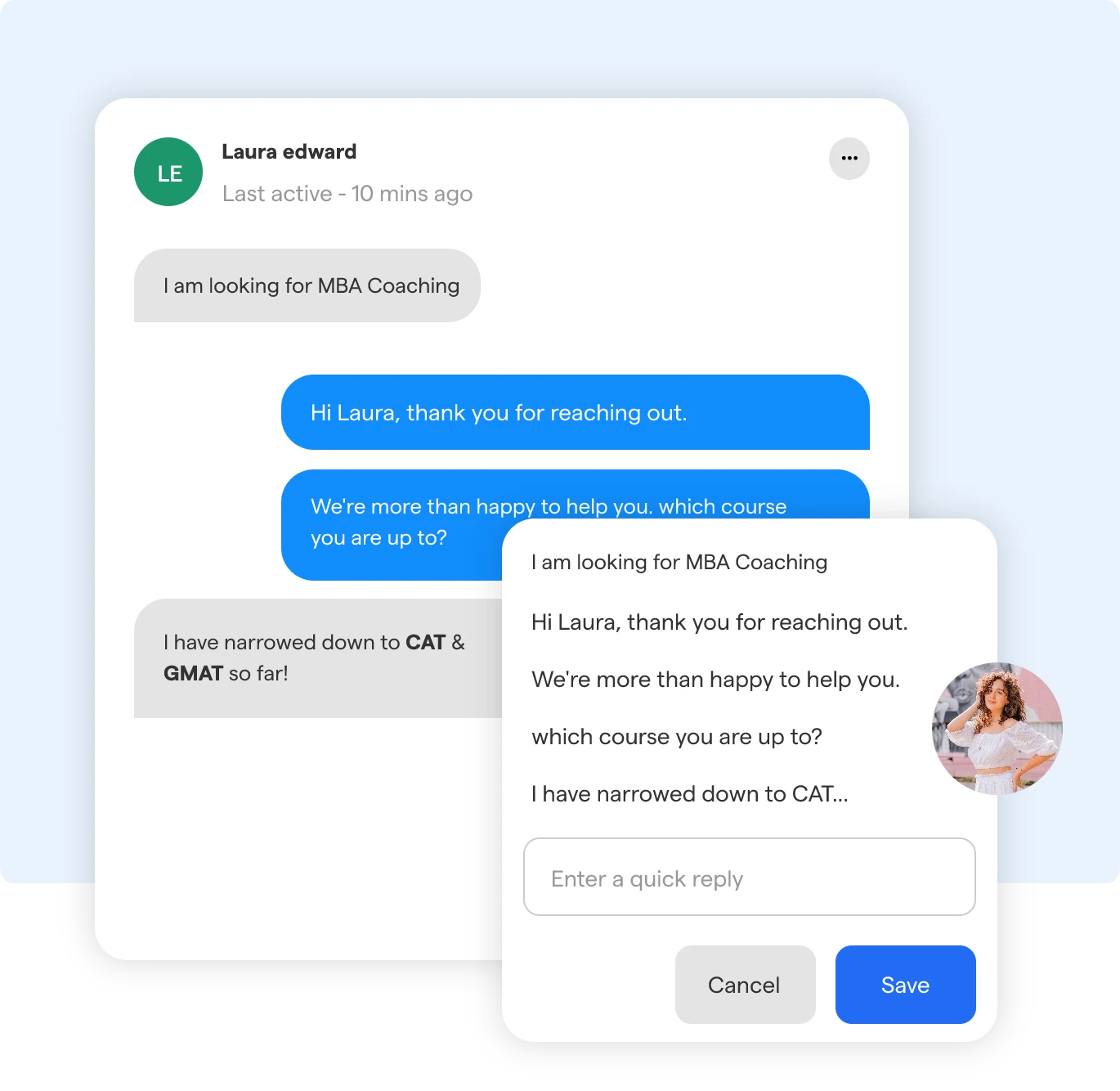
Lead Generation: AI chatbots can engage website visitors, qualify leads, and capture relevant data for sales teams to follow up on. They can initiate conversations, provide product information, and guide potential customers toward conversion.
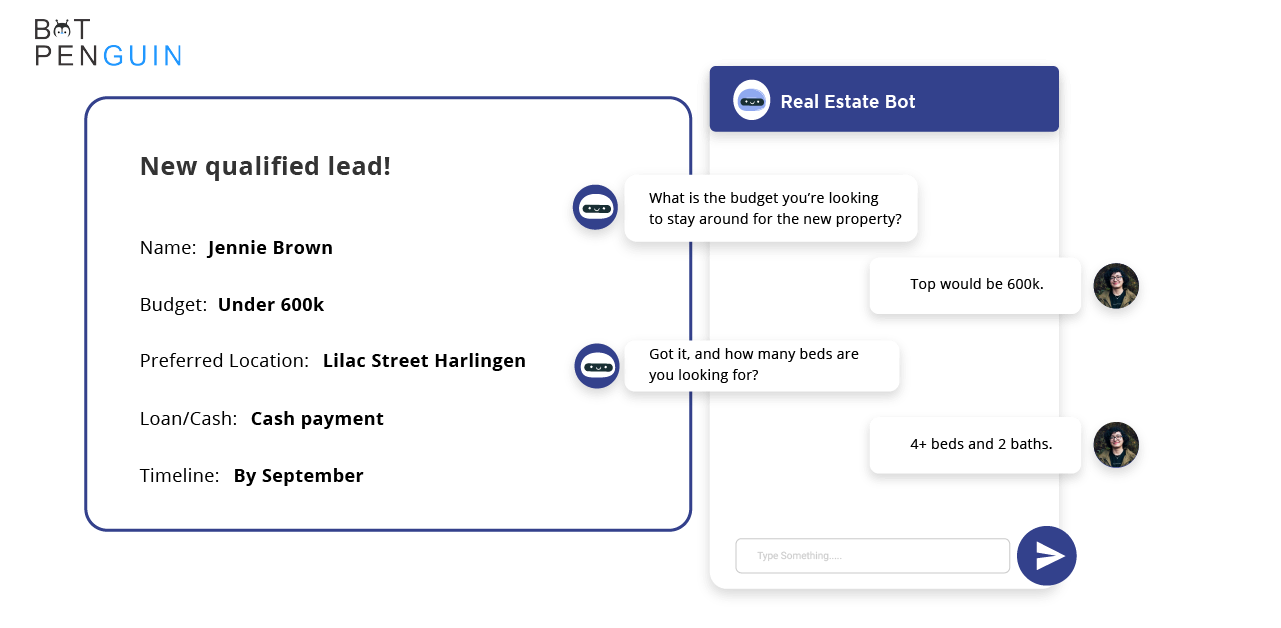
HR and Employee Support: AI chatbots can assist employees with HR-related inquiries, such as leave requests, benefits information, and onboarding processes. This frees HR teams to focus on more strategic activities and improves overall employee satisfaction.
IT Helpdesk: AI chatbots can troubleshoot common IT issues, guide users through self-service options, and escalate complex problems to human support agents when necessary. This reduces wait times and ensures faster resolution of IT-related problems.
Next, we will cover how enterprise AI chatbots work.
How Do Enterprise AI Chatbots Work?
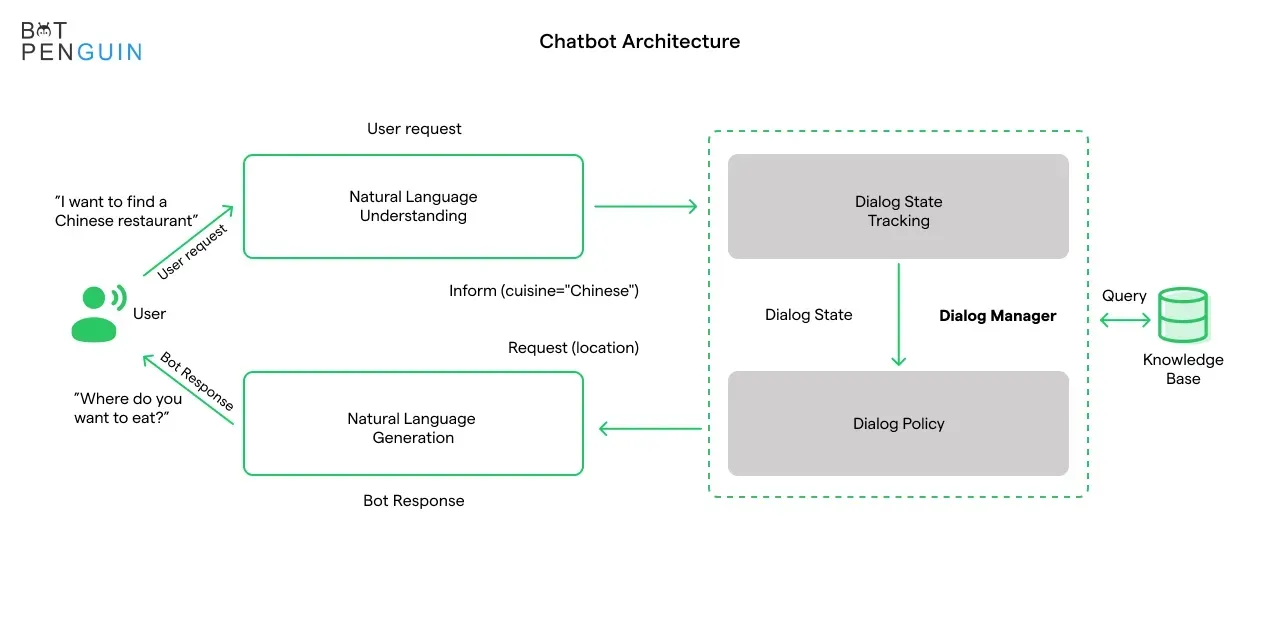
Now that we understand the potential use cases, let's investigate how exactly enterprise AI chatbots work.
Enterprise chatbots rely on various technologies to provide accurate and contextually relevant responses to user queries.
These technologies include natural language processing, which allows them to understand and interpret human language, and machine learning, which enables them to improve their responses based on user interactions.
Machine learning plays a crucial role in the development and training of AI chatbots. By exposing them to vast amounts of data and user interactions, they learn to recognize patterns, understand intent, and generate appropriate responses.
This iterative process enables chatbots to become more intelligent and better understand user needs. Integration with other enterprise tools and systems is another key aspect of enterprise AI chatbot functionality.
Enterprise AI Chatbots can connect with customer relationship management (CRM) systems, enterprise resource planning (ERP) systems, and other data sources to provide users with personalized information and complete tasks on their behalf.
For example, BotPenguin a free custom chatbot development platform aces in providing CRM integrations that include popular CRM platforms like ZOHO, Hubspot, Salesforce, Insightly, and many more.
With the combined benefits of CRM and Chatbots, BotPenguin makes automation services like lead generation and customer support more effective by unifying marketing and sales efforts in one place:
- WhatsApp Chatbot
- Facebook Chatbot
- Wordpress Chatbot
- Telegram Chatbot
- Website Chatbot
- Squarespace Chatbot
- Woocommerce Chatbot
- Instagram Chatbot
Best Practices for Implementing Enterprise AI Chatbots
Implementing AI chatbots in the enterprise world requires careful planning and execution. Here are some best practices to consider when implementing AI chatbots for your business.
Steps to Consider Before Implementing AI Chatbots
Before diving into the development and deployment of Enterprise chatbots, it's essential to take several preparatory steps.
These include:
Define Goals and Use Cases: Understand the specific goals you want to achieve with AI chatbots. Identify the areas where chatbots can bring the most value to your business, such as customer support, lead generation, or internal processes.
Conduct a Feasibility Study: Evaluate the technical and financial feasibility of implementing AI chatbots. Consider the available resources, infrastructure requirements, and potential return on investment.
Data Preparation: Gather and organize the relevant data that will be used to train the AI chatbot. This may include customer interaction data, product information, and frequently asked questions.
Suggested Reading:
Designing the Right Customer Experience
To create a positive customer experience with enterprise chatbots, it's important to focus on the design and user interface. Consider the following aspects:
Conversational Design: Design chatbot interactions to mimic natural conversations. Use clear and concise language and provide options for users to choose from when appropriate.
Minimize Friction: To achieve a seamless user experience, reduce the steps required to complete a task. Avoid repetitive questions and ensure smooth transitions between the chatbot and any human agents involved.
Addressing Privacy and Ethical Concerns
Privacy and ethics are paramount when it comes to implementing AI chatbots. Here are some guidelines to adhere to:
Transparency: Communicate to users that they are interacting with a chatbot. Inform them about what information is collected, how it is used, and any data retention policies.
Data Protection: Implement robust security measures to protect user data. Adhere to privacy regulations and industry best practices to ensure customer information is handled securely. Consider using security solutions like Bitdefender Free Antivirus to safeguard your systems.
Integration and Deployment Strategies
Integrating AI chatbots seamlessly into your existing systems and deploying them effectively is crucial. Consider the following strategies:
Integration with Enterprise Systems: Integrate your AI chatbot with other enterprise systems, such as CRM or ERP, to provide users with personalized and contextually relevant information.
Progressive Deployment: Start with a limited scope and gradually expand the functionality of your AI chatbot. This allows for iterative improvements and reduces the risk of overwhelming users with an unrefined chatbot.
After reviewing the best practices, let’s examine the future of Enterprise AI Chatbots in the enterprise world.
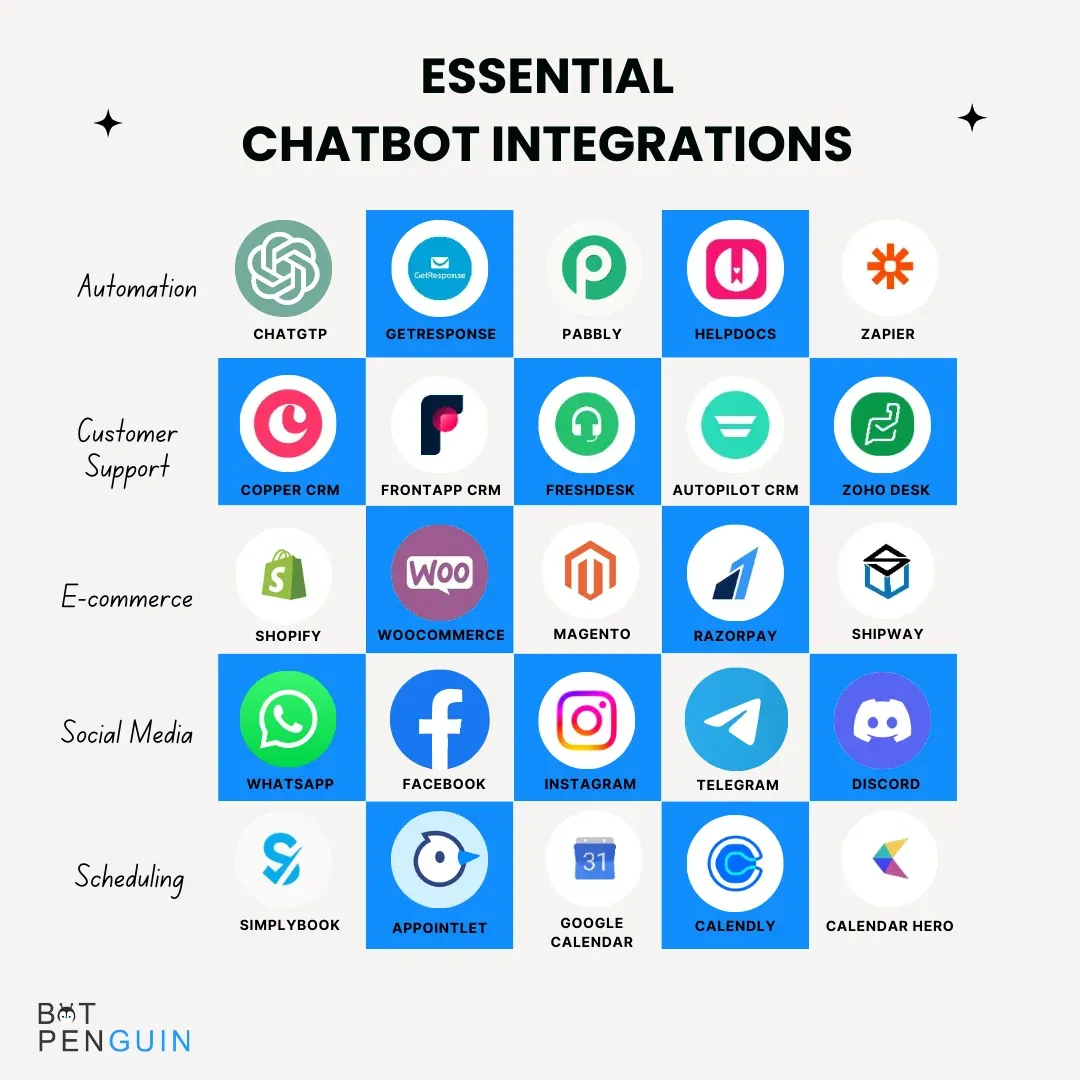
The Future of AI Chatbots in the Enterprise World
The AI future is bright. But realize rewards through careful steps. This section lights the path. The future of AI chatbots in the enterprise world is promising.
Let's explore what lies ahead.
Expected Growth of AI Chatbots in the Enterprise World
The adoption of AI chatbots is expected to grow rapidly in the coming years. As businesses realize the benefits of improved customer service, increased efficiency, and cost savings, AI chatbots will become an integral part of enterprise operations across various industries.
Advancements in AI Chatbot Technologies
Advancements in natural language processing and machine learning are driving the evolution of AI chatbot technologies. These advancements enable enterprise chatbots better to understand user intent, context, and emotions, leading to more accurate and personalized responses.
Additionally, AI chatbots are becoming more sophisticated in handling complex tasks, such as conducting transactions, scheduling appointments, or providing in-depth product recommendations. This opens up new possibilities for businesses to automate and streamline their processes.
Suggested Reading:
The Potential Impact on the Job Market
While AI chatbots are transforming the way businesses operate, there are concerns about their potential impact on jobs.
However, rather than replacing human workers, AI chatbots are more likely to augment their capabilities. By automating repetitive tasks, chatbots free human employees to focus on more complex and value-added activities, leading to higher job satisfaction and productivity.
Next, we will cover real world examples of Enterprise AI Chatbots.
Real-world Examples of Enterprise AI Chatbots
AI chatbots have changed the way businesses operate and engage with their customers.
Let's explore real-world examples of companies that have successfully implemented enterprise AI chatbots, the use cases in various industries, and the impact on their business operations.
Companies That Have Successfully Implemented AI Chatbots
Numerous companies have embraced enterprise chatbots to enhance their customer experiences and streamline their operations.
Here are a few notable examples:
Bank of America: Bank of America implemented an AI chatbot named "Erica." Erica assists customers with various tasks, including balance inquiries and bill payments, and provides financial insights. By leveraging AI, Bank of America has improved customer engagement and reduced the burden on their call centers.
Domino's Pizza: Domino's Pizza introduced an AI-powered chatbot that enables customers to order pizza through popular messaging platforms. This chatbot, named "Dom," uses natural language processing to understand customer orders and preferences accurately. Domino's has seen significant growth in digital sales and improved efficiency in its ordering process.
Starbucks: Starbucks created a chatbot called "My Starbucks Barista" that allows customers to place and customize their orders through a mobile app. By leveraging AI and machine learning, Starbucks has improved order accuracy and reduced wait times, resulting in enhanced customer satisfaction.
Use Cases in Various Industries
AI chatbots are used across various industries to streamline operations and provide exceptional customer experiences. Here are a few examples of use cases:
Healthcare: AI chatbots are being used by healthcare providers to provide instant responses to patient inquiries, schedule appointments, and offer medical advice. These chatbots help reduce patient wait times and improve access to healthcare services.
E-commerce: Chatbots in e-commerce streamline the buying process, assist customers with product recommendations, and provide order tracking updates. They enhance customer engagement and provide personalized shopping experiences.
Human Resources: AI chatbots in human resources can automate routine tasks such as employee onboarding, answering frequently asked questions, and requesting time off. This allows HR teams to focus on strategic initiatives and employee development.
Impact on Business Operations
The implementation of enterprise chatbots has had a significant impact on business operations. Here are a few key benefits:
Improved Customer Service: AI chatbots provide round-the-clock customer support, ensuring that customers can get the information they need at any time. This leads to improved customer satisfaction and loyalty.
Increased Efficiency: With AI chatbots handling routine tasks, businesses can achieve higher efficiency levels by automating processes. This frees up human employees to focus on more complex and value-added activities.
Cost Savings: AI chatbots can reduce the need for human resources, such as customer service representatives, leading to cost savings for businesses. Additionally, chatbots can handle multiple customer queries simultaneously, further reducing operational costs.
Conclusion
The potential of enterprise AI chatbots to revolutionize businesses is undeniable. However, it is essential to remember that these AI-powered tools should be designed to augment human capabilities, not replace them. As we continue to advance in technology, we must pay attention to how we work together in harmony alongside AI solutions.
With BotPenguin’s user-friendly chatbot-building platform, you can create AI assistants crafted specifically for your business requirements.
Tap into powerful features such as robust natural language processing (NLP) and seamless integration across multiple platforms – all vital components in building chatbots that truly engage customers and boost your operational efficiency
Offering flexible pricing options that cater to both small businesses and larger enterprises, BotPenguin enables you to explore the capabilities of AI chatbots in a cost-effective manner.
Empower your business with AI chatbots and redefine customer service on your terms.
Sign up with BotPenguin today and take a step towards a future where you're in control, collaborating seamlessly with your intelligent AI assistant.
Suggested Reading:
Chatbot Development Services: Get Enterprise Ready Solutions
Frequently Asked Questions (FAQs)
What is an enterprise AI chatbot?
An enterprise AI chatbot is an advanced chatbot powered by artificial intelligence specifically designed for businesses. It can interact with customers, automate tasks, and provide personalized assistance while representing the brand.
How can enterprise AI chatbots benefit businesses?
Enterprise AI chatbots can enhance customer experience, streamline operations, and improve efficiency. They can handle routine inquiries, provide quick responses, and collect valuable customer data, leading to increased productivity and customer satisfaction.
What features to look for in an enterprise AI chatbot?
When choosing an enterprise chatbot, look for features like natural language processing, sentiment analysis, integration capabilities, scalability, and customizable dialogues. These features ensure a more intelligent and adaptable chatbot suited to your business needs.
How are enterprise AI chatbots trained?
Enterprise AI chatbots are trained using machine learning algorithms on vast datasets, including customer interactions, to understand language patterns, intent, and context. Additionally, they can be fine-tuned with specific industry knowledge and frequently asked questions to improve performance.
How to implement an enterprise AI chatbot in my business?
To implement an enterprise chatbot, you need to define its purpose and scope, identify use cases, prepare training data, and set up the necessary infrastructure. Training, testing, and regular maintenance are essential to ensure the chatbot's effectiveness and accuracy.


